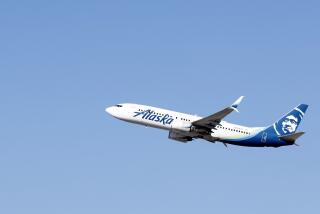A Tenacious CEO Keeps United Flying
On a sunny December day in 2002, nearly 100 United Airlines employees gathered at the carrierās San Francisco maintenance base to square off with their new boss, Glenn Tilton.
United was in dire trouble. The giant airlineās losses were mounting and its service was dreadful. Years of squabbling between executives and union workers had reached a fever pitch, with each blaming the other for the companyās slide.
Now a new chief executive -- a man who came from the oil industry and had never run an airline -- faced the rank and file. One worker piped up to him: āAll of these mistakes by management over the years, and not one apology.ā
Tilton shot back: āOK, everybody be quiet for a moment. Ready? I apologize.ā Recrimination about old mistakes, he added, was an āalbatrossā around Unitedās neck, āand we have to let it go.ā
The exchange neatly summed up Tiltonās belief that United couldnāt be fixed unless he first persuaded the employees to look ahead, not back, and see that its high costs, lofty fares and subpar service would no longer fly in an industry flirting with ruin.
āThe company was so mired in the past,ā Tilton said in a recent interview, āthat our culture wasnāt able to face the facts going forward.ā
Since then, the 57-year-old Tilton has led a campaign to transform United that has caused the employees more pain than they probably could have imagined that day in San Francisco -- but for which Tilton does not apologize.
In largely uncompromising fashion, he has shoved through wrenching changes, including slashing 24,000 jobs and wringing $3 billion from the remaining 58,000 workersā annual wages and benefits, to keep the nationās second-largest airline from flying into oblivion. The last of those concessionary contracts, with ground workers represented by the International Assn. of Machinists, was ratified last week.
At stake is the future of a company that serves 70 million travelers a year and is the busiest airline at Los Angeles International Airport, but one that has lost $10 billion since 2000 and is now under bankruptcy protection.
In the process, Tilton almost single-handedly created a crisis of confidence in Americaās corporate pension system when he also dumped Unitedās underfunded employee retirement plans, with their $6.6 billion in liabilities, into the lap of the federal government. The move sparked congressional hearings and calls for legislation and put the formerly low-profile executive -- the son of a CIA agent who once aspired to work at Langley himself -- firmly in the national spotlight.
Tiltonās relentless cost cutting has helped keep United afloat, and the airlineās on-time performance and customer service have rebounded dramatically, an improvement Tilton credits to the airlineās employees.
Tiltonās backers say his aggressive efforts to openly and bluntly communicate his strategy with Unitedās employees -- even though that strategy hurt their wallets -- has earned him their grudging respect.
āPeople have rallied behind him,ā said James OāConnor, a 21-year board member of Unitedās parent, UAL Corp., and the director who led the search that landed Tilton. āPeople are taking him very seriously because they know he has tremendous resolve.ā
But the gains have been achieved at considerable risk to both United and the flying public. In May, United narrowly avoided strikes by its mechanics, flight attendants and other ground workers protesting Tiltonās effort, actions that could have severely damaged the airline while throwing the nationās air-traffic system into chaos.
Critics fear that Tiltonās corporate high-wire act is alienating the employees he needs to achieve a long-term turnaround at United. The airlineās flight attendantsā union is still threatening to strike over the pension issue and wants Tilton, who is also UALās chairman, thrown out.
āThey brought in a guy to run over the unions, and he did it,ā said Bill Brandt, CEO of Development Specialists Inc., a management consulting firm in Chicago. āCan you imagine that heāll now be a leader to whom these people cleave in the coming years? The answer is indisputably no.ā
But if Tilton can pull United out of bankruptcy and make the carrier profitable again, its lower labor costs and other streamlining steps will make the airline āa force to be reckoned with,ā said Alan Sbarra, a principal of Roach & Sbarra Airline Consulting in San Francisco.
Irresistible Offer
When United went looking for a new CEO in August 2002, even the headhunter who proposed Tilton for the job quietly urged him not to take it. The airlineās history of dysfunctional labor relations and the sheer complexity of its problems, he said, were too daunting.
But Tilton, who was vice chairman of the Bay Area oil giant then known as ChevronTexaco Corp., couldnāt resist trying to turn around a corporate icon. And he had the right disposition for tackling Unitedās problems, according to colleagues and friends who describe him as focused, dogged, even-tempered, direct and personable with any employee.
āWith me, anyway, heās never once lost his temper or his cool,ā said James B. Lee, a vice chairman of JPMorgan Chase & Co., one of Unitedās major lenders.
He encourages workers to e-mail him, and roughly 100 oblige him each day. If heās away from his desk, Tilton bats out replies on his BlackBerry wireless hand-held. He also takes United flights several times a month to meet crews, airport personnel and other employees.
āThis guy keeps up a travel schedule that would break people 15 years younger,ā said Gerald Rosenfeld, CEO of Rothschildās North American unit, Unitedās financial advisor.
Employees are free to ask him anything they wish but must expect a frank reply. āHe is what you see; he doesnāt pull punches,ā said Clarence Cazalot Jr., CEO of Marathon Oil Corp. and a former colleague of Tiltonās.
On a typical day at Unitedās headquarters in the Chicago suburb of Elk Grove Township, Tilton arrives at about 7:15 a.m. He frequently eats breakfast in the company cafeteria and lunch at his desk -- there is no executive dining room -- and logs 11 or 12 hours before leaving.
Tilton is usually nattily dressed but takes off his jacket whenever possible. Heās a coffee addict who also likes an occasional scotch at night. He seldom swears and is more likely to discuss politics than sports over a meal.
The longtime executive neither mopes when things go poorly nor exults when they go well, associates said.
āI canāt imagine Glenn giving someone a high-five,ā said one colleague.
Tilton, married for 38 years with two grown children, lives in Chicago. He has yet to take a full weekās vacation since joining United, though he has gotten away for long weekends to ride quarter horses at his ranch in Santa Fe, N.M., or to fish for tarpon with friends in Boca Grande, Fla.
Tilton is passionate about United but heās also a slave to facts, which told him the airline had no other options than the ones he chose, associates said.
āComing from the oil industry, Glenn never had any emotional attachment one way or the otherā to Unitedās past, Rosenfeld said. āHis view is: āHere are what the facts tell me I ought to be doing, and Iām going to do that.ā ā
Thatās often meant drawing lines in the sand. For example, Tilton planned to keep United flying even if there had been a strike by any of the unions, according to sources familiar with the airlineās stance who asked not to be identified. Tilton declined to comment.
Tilton, who was born in Washington, spent several of his teenage years in South America as his father, John, held various assignments for the Central Intelligence Agency.
After returning to the U.S. in 1966, Tilton earned a bachelorās degree in international relations at the University of South Carolina.
āI was certain I was going to go into the CIA or the State Department or some agency of the federal government that allowed me to travel abroad,ā he said.
First, though, he took what he thought would be an interim job at Texaco Inc. as a sales trainee in the Washington area, then fell in love with the oil business. He stayed with Texaco for three decades, climbed the corporate ladder and eventually became Texacoās CEO in early 2001.
But Tilton got the top job only after Texaco had agreed to be purchased by Chevron Corp., whose then-CEO, David OāReilly, kept the No. 1 post after the merger. By August 2002 it was clear Tilton wouldnāt be running Chevron anytime soon, if ever.
Thatās when United called.
Daunting Challenge
The airline, founded in 1928, was coming apart at the seams. Air travel was still struggling to rebound from the Sept. 11, 2001, terrorist attacks. The economy was weak. Low-fare airlines were gaining strength, especially within the business community.
With travel down and fares dropping, Unitedās labor costs and other expenses now stood far too high for the airline to turn a profit. The company had applied for a loan guarantee from the Air Transportation Stabilization Board -- set up after Sept. 11 to help the airline industry -- but said bankruptcy was an option.
The companyās labor relations were in shambles, with employees staging work slowdowns that alienated customers. And management was making missteps of its own, including a botched merger with US Airways Group Inc., critics said.
As United officials interviewed Tilton, āI donāt think any of us
Three months after Tilton took over, the transportation board rejected Unitedās first bid for a loan guarantee. Tilton responded by taking United into bankruptcy protection.
Unitedās unions at first publicly backed Tilton, but, in the aftermath of his dramatic cuts, he has come under constant attack. The Assn. of Flight Attendants union, for instance, āwas one of Glennās biggest champions ... and asked people to give him a chance,ā said Greg Davidowitch, head of the AFAās United branch. Now, he said, āwe find ourselves seeking new management.ā
Tiltonās compensation also has been criticized by employees and lawmakers, who grouse that heās collecting lofty wages and other benefits while slashing those of his employees.
According to United, Tiltonās salary, bonus and other cash compensation last year totaled $1.2 million, higher than the cash compensation of most airline CEOs. But Tilton receives no stock options or grants, United notes, so his overall compensation is relatively low compared with that of other airline chiefs and is well below the $3.6 million he received during his last year in the oil industry.
Tilton also doesnāt have a pension at United, although the airline agreed to pay him $4.5 million for terminating his contract at Chevron.
Regardless, Tiltonās supporters say Unitedās employees respect him because āhe is the first person to give credit to the unions, to the employees, to the rest of management,ā Rosenfeld said. āHeās not walking around saying, āI am the one making this airline run on time.ā ā
Theyāre not out of the woods yet. United still must raise about $2 billion to exit bankruptcy, which the airline says is achievable now that it has the new labor contracts and other cost savings in hand.
Even after it leaves Chapter 11, which United predicts it will do this fall, the company must keep battling record-high fuel costs and the growing clout of low-fare carriers such as Southwest Airlines Co. and JetBlue Airways Corp.
Tilton vowed that United would be ready, saying, āWe have it within us to do the work.ā Then heāll consider a vacation, he said, āwhen weāre out and on our way.ā
More to Read
Inside the business of entertainment
The Wide Shot brings you news, analysis and insights on everything from streaming wars to production ā and what it all means for the future.
You may occasionally receive promotional content from the Los Angeles Times.











